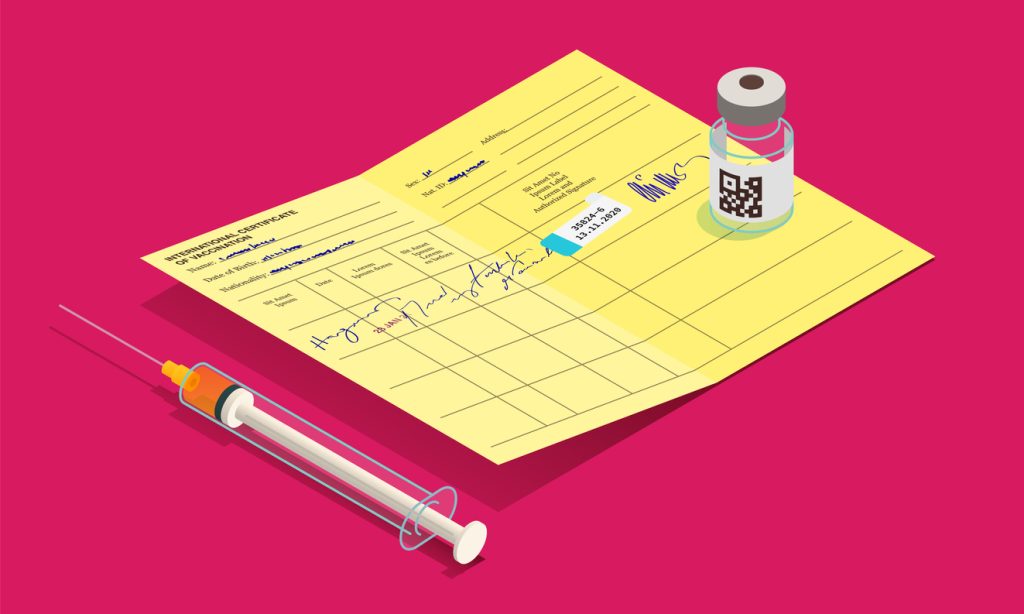Are Your Routine Vaccines Up to Date?

Immunization has saved more lives than any other health intervention and increased life expectancy in Canada and around the world. Routine vaccination for both kids and adults is a cornerstone of public health. Beyond protecting our personal health as individuals, vaccines have also successfully controlled or eliminated outbreaks of serious infectious diseases like polio, rubella and measles in Canada when our national vaccine coverage rates remain high.
It was just over 65 years ago that parents across Canada began to breathe a sigh of relief as the first vaccines against polio began rolling out. Polio (or poliomyelitis) is a highly infectious viral disease that can result in permanent paralysis or death in severe cases. Prior to the development of a polio vaccine, regular outbreaks of the disease resulted in school closures and required many children and families to isolate or quarantine as the infection spread rapidly through communities. Fortunately, thanks to universal vaccination programs and continued high vaccination coverage, polio has been eliminated in Canada.
With such tremendous progress and so many lives saved, Canada’s annual National Immunization Awareness Week (April 23-30), is truly a time to celebrate the better health outcomes we enjoy thanks to vaccines. The Pan-American Health Organization’s slogan for vaccination week in the Americas this year is “Are you fully vaccinated? Get all your shots” and we are reminded that we need to keep our vaccinations up to date at every age and that adults need vaccines too!
Vaccines provide a crucial layer of protection
Many of our parents and grandparents remember a time before access to what we now consider routine vaccinations. We are now able to prevent serious illness, hospitalization, and death throughout the course of our life from once common diseases, like whooping cough, tetanus, diphtheria, measles, mumps, rubella, chickenpox, and shingles (both due to varicella virus). Since 2006, people in Canada also have access to vaccines that protect against human papillomavirus or HPV infection, which is a highly transmissible virus that can lead to several forms of cancer.
Some vaccines require just a single dose, while others require multiple doses or regular boosters throughout our lifetime. Checking in with your health care provider or local public health is the best way to make sure you are up to date on the vaccination schedules recommended for you and your family.
Time to catch up on vaccination delayed or missed during the pandemic!
The COVID-19 pandemic disrupted many aspects of our daily lives, causing delays in our regular medical checkups and, by extension, in the timeliness of getting important routine vaccinations, particularly for children. While research is ongoing to understand the full impact on routine childhood immunization, we do know that there were setbacks, and that many school-based programs are playing catch up. Provinces and territories are closely monitoring vaccination coverage rates and have implemented a range of interventions, including catch-up clinics in schools and sending out reminders, to prevent diseases such as measles, polio and whooping cough from making a comeback. Some jurisdictions are already reporting an increase in coverage rates following their immunization catch-up campaigns, but they need our help.
To be sure you and your family are up-to-date with your vaccination schedules, it is important to check with your health care provider, to ask questions, and arrange to catch up on any missed or delayed vaccinations. Information about the importance of vaccination is also available on Canada.ca, including vaccines for children and adults, or consult your local, provincial or territorial health authorities.
Looking ahead
although getting through the pandemic was challenging, we can take heart in knowing we achieved great things by working together on the largest, most complex mass vaccination campaign in Canadian history.
I want to extend my thanks to Canada’s healthcare workforce, immunizers, volunteers, community workers, and researchers for all the work they’ve done and continue to do to build a healthier Canada through immunization. Whether working individually or coming together in community-based initiatives, such as those supported by Canada’s Immunization Partnership Fund (IPF), it’s people who make vaccines work, by getting vaccinated and supporting others to get vaccinated.
IPF projects demonstrate how using local knowledge, tailored outreach, and community interventions to address information gaps and improve access can help reach underserved and undervaccinated populations and reduce barriers to vaccination. In this way, we can use what we have learned from the successful rollout of COVID-19 vaccinations across Canada to strengthen our collective immunity and improve access and equity for all vaccines going forward.














